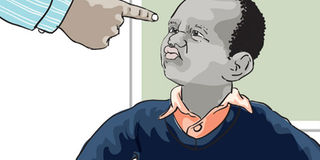OFF MY CHEST: Who is responsible for the morals of schoolchildren?

Who is responsible for the moral uprightness of a schoolgoing child? ILLUSTRATION | IGAH
What you need to know:
Parents ought to understand that their input is very crucial in the growth and development of their children.
Teachers can only play the surrogate parent but will never match what a parent should do.
- Do you have feedback on this article? E-mail: [email protected]
Recently, during a parent-teachers meeting at a school in the Western region of Kenya, a rather humorous but sensitive story popped up. There was a form two student who "would not allow the teachers he loathed to teach".
By coincidence, these teachers’ lessons are always slotted for afternoons, which are usually hot. The student would simply pass gas in class, making everyone uncomfortable.
When this matter was raised, a parent stood and unashamedly demanded that this boy’s parents be made to stand up and do what their son does if they cannot counsel him.
A friend also told me another story still touching on behaviour. During an Annual General Meeting in a certain girls’ school, a number of parents ganged up and demanded to know why the girls were immoral. One teacher stood up and gave them a piece of his mind. He asked the parents if a guinea fowl has ever given birth to a hen, insisting that even if that happened the offspring would still have those white dots on otherwise black feathers. With this, he tamed the parents.
TEACHING MORALS
Who is responsible for the moral uprightness of a schoolgoing child? Is it the parents and guardians, or the teachers? This is question becomes especially confusing when it comes to boarding schools. This is where some parents simply ‘dump’ their children. Dump, because they do not reappear to find out how their children are doing at school except when summoned for a parents’ meeting. Unfortunately, some send relatives. Close or distant, a relative cannot match the figure that is the parent or guardian.
Parents ought to understand that their input is very crucial in the growth and development of their children. Teachers can only play the surrogate parent but will never match what a parent should do.
Some parents mollycoddle their children, and can even go to the extent of not allowing teachers to admonish their children for wrongdoing. They will arrive at school, barking as if high on something illegal, and demand, not ask, to see the principal. The implication in this case here is that the teacher who tried to correct the child is a puppet. Whoever he or she needs to see is the puppeteer.
When parents leave their children in the hands of teachers, they should have faith in them. Faith that they will be safe and that teachers will mould them into holistic citizens.
Parents best understand their children. They have raised these children. They could be aware of the roots of certain behaviours.
Parents know their children better. They understand how they behave and even how to tame them. They are the ones who can monitor their tracks back at home.
It is worth noting that only a parent would know who interacts with his or her child. Teachers do not know the company a child keeps at home.
Another important point is that most secondary school students are in the adolescence stage, a stage where peer pressure and influence thrives.
It is undoubtable that a parent would be privy to the time his or her daughter leaves and goes back home. Even if he or she is not, it is still clear that he or she can easily find out.
DUTY
The question of whether bad behaviour is acquired while at home or at school remains a puzzle. And it remains a collective effort by teachers and parents to streamline this menace.
We have to acknowledge that we live in an age where children must be ‘handled with care’, so much as close even to pampering. But then should this make morals a peripheral issue?
When teenagers smoke bhang or shisha or get involved in sexual matters, where do we place the blame? Do we say the parents gave them poor upbringing? Or do we say the teachers have failed to properly monitor their growth and development at school?
Discipline is about self-control and self-control cannot be mentioned without it being associated to morals. What is right or wrong for a young man or woman will highly depend on what goes on around them; what they see.
***
Do you have feedback on this article? E-mail: [email protected]




